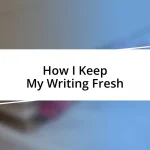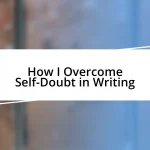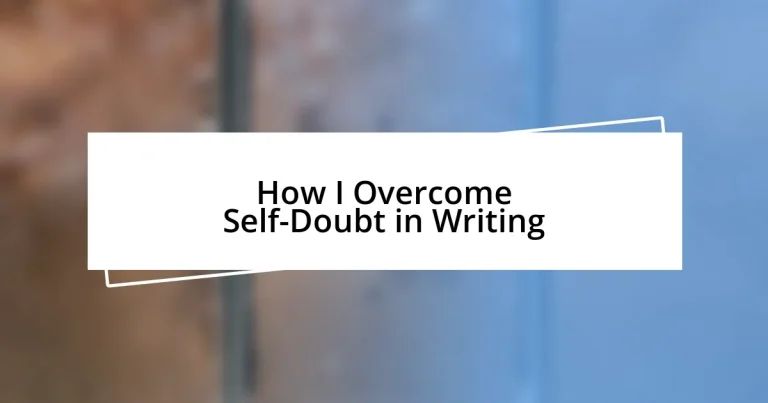Key takeaways:
- Self-doubt in writing often arises from comparison, perfectionism, and external pressures, making it essential for writers to recognize their triggers.
- Implementing a daily writing routine, seeking constructive feedback, and using positive affirmations are effective strategies to combat self-doubt.
- Celebrating small writing achievements can boost morale and confidence, fostering a more positive writing experience.
- Maintaining confidence is an ongoing journey supported by a writing community and continued learning to refine skills.
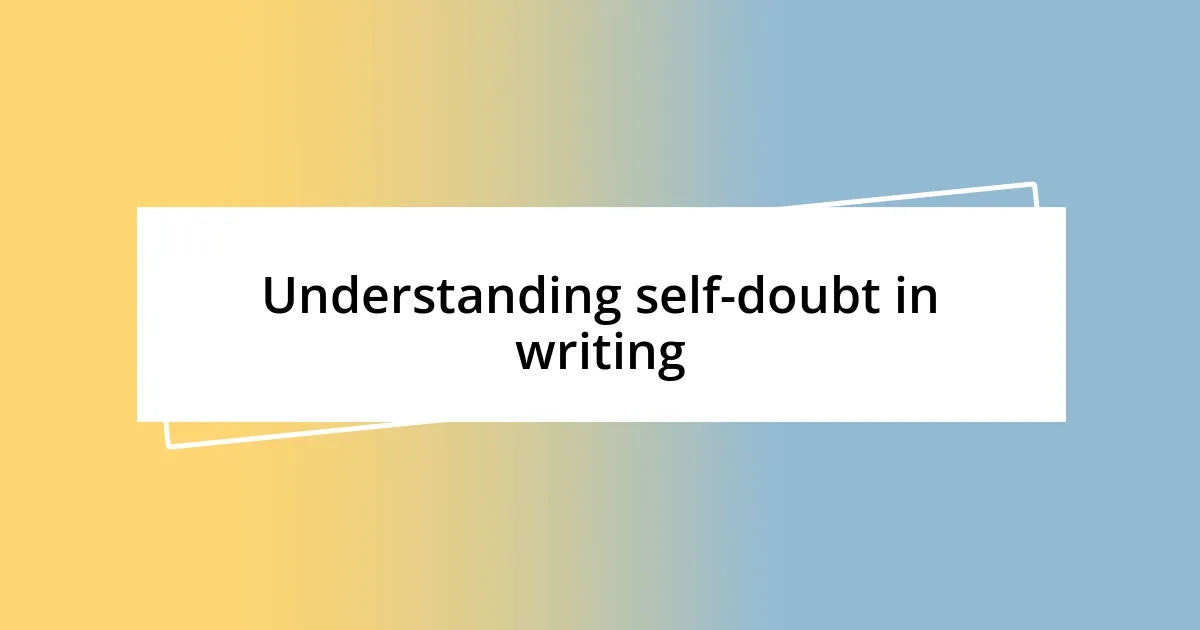
Understanding self-doubt in writing
Self-doubt in writing is something I’ve grappled with over the years. I remember sitting in front of my laptop, staring at a blank page, feeling the weight of my insecurities. It makes me wonder: why do we put so much pressure on ourselves to be perfect right from the start? That fear of not measuring up can be paralyzing.
It’s fascinating to recognize that self-doubt often stems from comparison. I can’t count how many times I’ve scrolled through social media, envying the seemingly flawless work of others. In those moments, I had to remind myself that everyone struggles with their own doubts, even if it isn’t evident on the surface. What if those writers I admire feel the same way beneath their polished words?
The emotional rollercoaster of self-doubt can also affect creativity. For instance, there was a time when I felt like my voice was lost amidst the noise of others. That internal dialogue—questioning my talent and my ideas—really stifled my writing. I often ask myself: does self-doubt fuel growth, or is it simply a barrier to it? Understanding this aspect makes me realize that self-doubt might just be a part of the journey, not the destination.
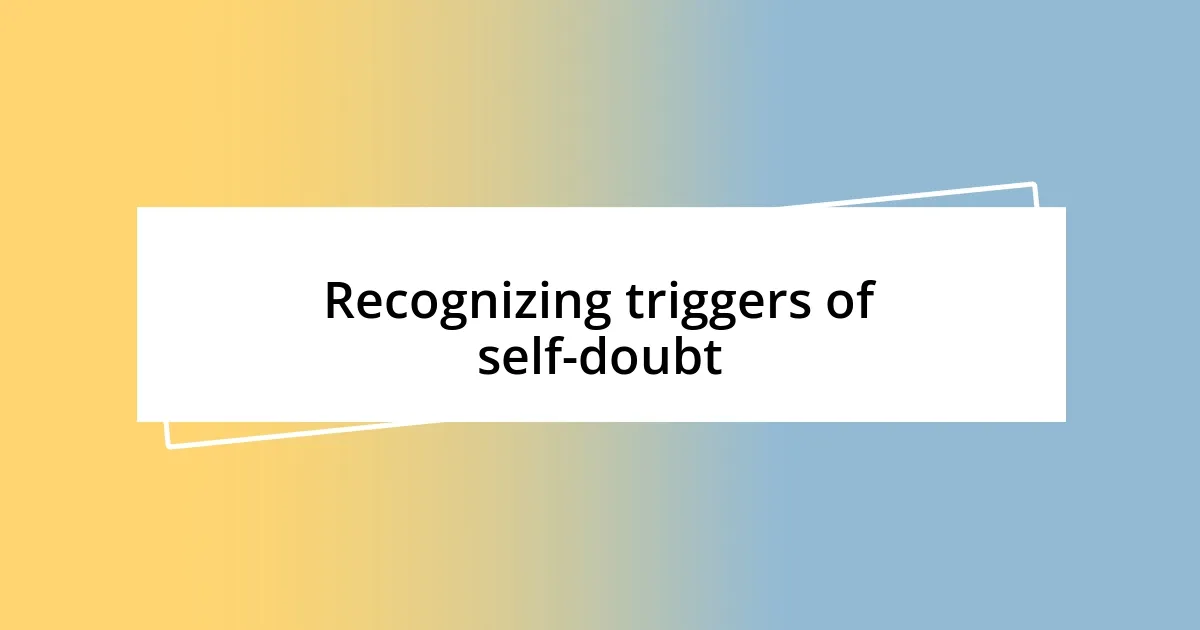
Recognizing triggers of self-doubt
Recognizing the triggers of self-doubt is essential for every writer. For me, it often starts with deadlines looming over my head. I vividly remember one project where the pressure made me second-guess every word I typed. It’s as if the ticking clock amplified those nagging fears, convincing me that my best wasn’t good enough. I’ve learned that identifying these moments helps me tackle my self-doubt head-on.
Here are a few common triggers that you might resonate with:
- Comparing my work to others: I still catch myself scrolling through posts of writers whose styles seem so much better than mine.
- Perfectionism: The idea that every sentence must be flawless before moving on has left me paralyzed at times.
- Negative feedback: Even the slightest criticism can send me into a tailspin, making me question my entire approach.
- Isolation: When I work alone for too long, I start doubting whether my ideas even matter.
- Fear of judgment: I often worry about how my writing will be received, which can be a daunting barrier to overcome.
By recognizing these triggers, I’ve found it easier to create strategies to keep self-doubt at bay.
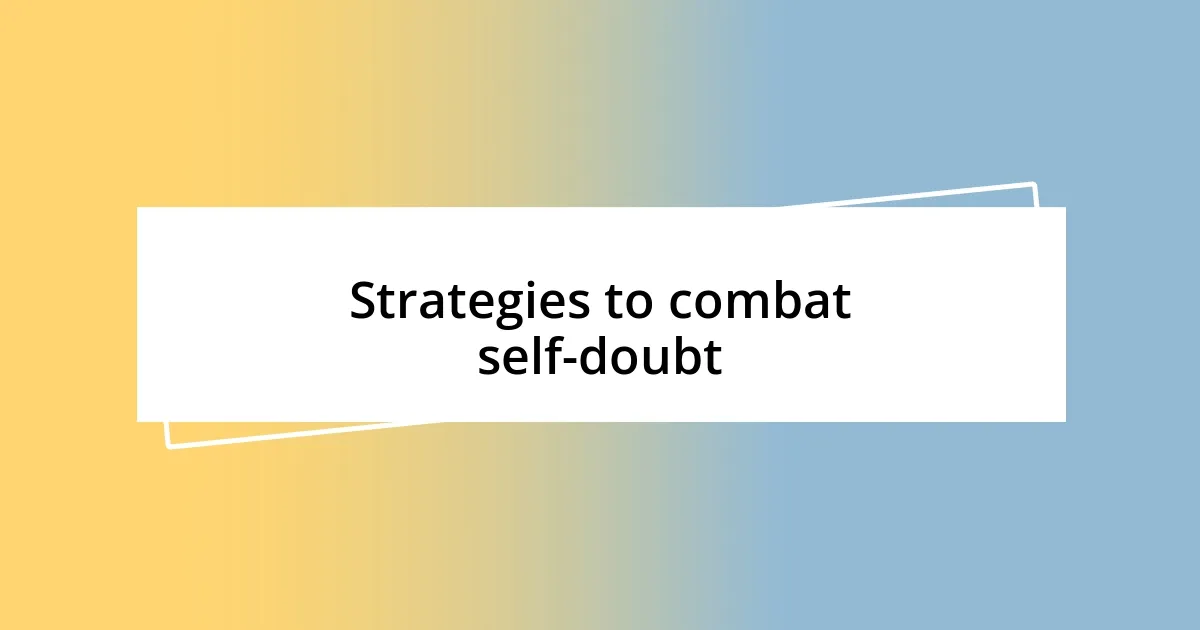
Strategies to combat self-doubt
To combat self-doubt, I’ve developed a few key strategies that have proven effective for me. One of the most helpful practices is embracing a daily writing routine. By setting aside dedicated time each day to write—without any judgment—I’ve discovered that consistency can break the cycle of fear. It’s often during these sessions that I find my best ideas flowing, regardless of how critical my inner voice may be.
Additionally, seeking feedback from trusted friends or fellow writers has been instrumental. At times, I would hesitate to share my work, fearing harsh criticism. However, I learned that constructive feedback can reveal strengths I often overlook. For example, after sharing some early drafts with a close friend, I was surprised to hear them praise aspects I felt insecure about. This experience taught me that our doubts can skew our perception, making it essential to gain an outside perspective.
Moreover, positive affirmations play a surprisingly pivotal role in building my confidence. I remember creating a short list of affirmations—simple phrases like “My voice is valid” or “Progress over perfection.” Reading these aloud each morning became a sort of ritual, reinforcing my belief in myself as a writer, even on days when doubt lingers.
| Strategy | Description |
|---|---|
| Daily Writing Routine | Establishing a non-judgmental writing space daily to foster creativity. |
| Seeking Feedback | Sharing drafts with trusted peers for constructive criticism and encouragement. |
| Positive Affirmations | Using uplifting phrases to combat negative self-talk and reinforce confidence. |
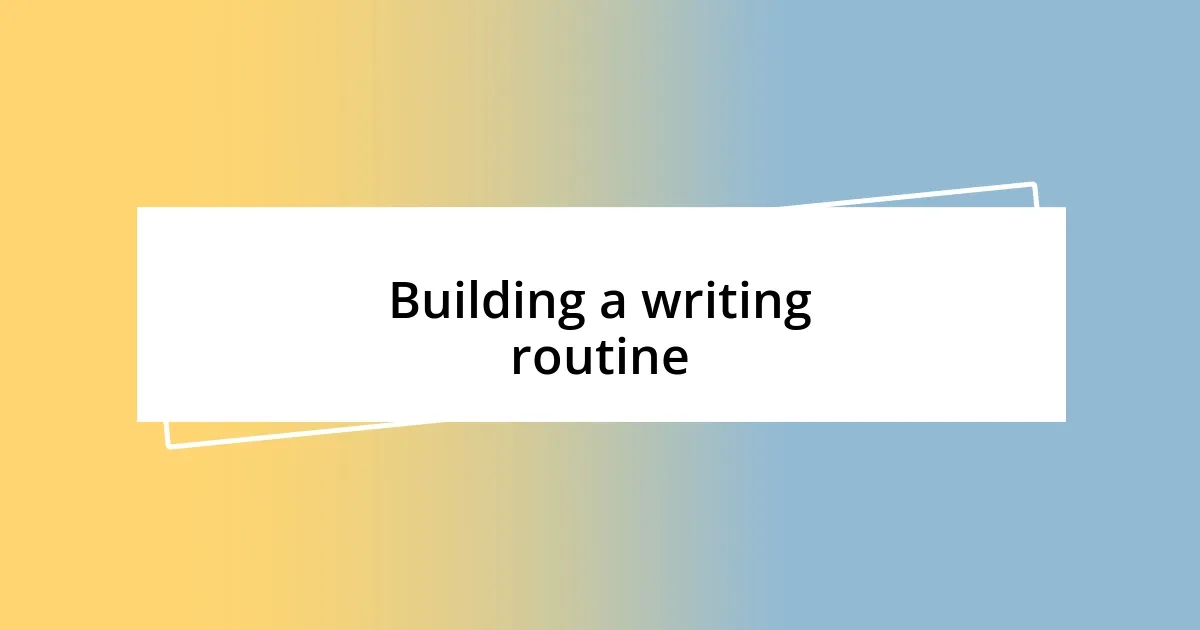
Building a writing routine
Establishing a solid writing routine has been a game changer for me. I remember the initial struggles of trying to carve out time to write amidst a busy life. It felt overwhelming at first, but committing to just 15 minutes each day transformed my relationship with writing. Isn’t it fascinating how just showing up can create a space where creativity thrives? Each session became a commitment to myself, a promise that I would never run away from my pen.
As I developed my routine, I found that it not only fostered creativity but also served as a safety net against self-doubt. There’s something reassuring about knowing that each word is part of a larger journey. I reflect on times when I’d sit down, even when my mind felt blank, and allow myself to free-write without expectation. Those moments often resulted in unexpected ideas or lines of prose that amazed me. Has that ever happened to you? That sudden spark can emerge when we least anticipate it.
Moreover, I learned to treat my writing time as sacred. Blocking off my mornings for this ritual helped create a mental clarity that lifted my spirits. I recall a particularly gloomy morning when I almost skipped my session, thinking it’d be pointless. But when I committed to just writing about my feelings—letting the words flow freely without self-judgment—I felt lighter. I truly believe that this space is where I find my authenticity, and breaking through that initial barrier allows me to tackle self-doubt more effectively.

Seeking feedback effectively
When seeking feedback, I’ve learned that aiming for the right balance is crucial. Initially, I shared my work with everyone, eager for reassurance, but soon found that not all feedback is created equal. It’s like choosing which voices to listen to in a crowded room; I now focus on feedback from those who understand my goals and style. This targeted approach has made all the difference in my writing journey. Have you ever found unexpected insights in critique from someone you deeply respect? I certainly have, and it can be a beautiful experience.
At one point, I decided to join a small local writing group. While I was nervous, sharing my work in a supportive environment helped me tremendously. The members not only provided thoughtful critiques but also noticed strengths I never acknowledged in myself. I remember feeling anxious about reading a chapter aloud, convinced it would flop. But hearing the group’s positive reactions reminded me of the value in collaboration. Each nod or smile fueled my confidence, reinforcing the idea that feedback, even if it’s not what I expected, can shape me as a writer.
In practical terms, I’ve learned to approach feedback sessions with an open mind while maintaining clarity on what I hope to achieve. When I send out drafts, I ask specific questions—like “Does this section resonate emotionally?” or “Is my message clear?” This technique encourages focused dialogue and ensures I’m gathering insights that truly matter. Reflecting on my early attempts, I often left feedback discussions feeling overwhelmed. But now, I leave energized, with fresh perspectives and a renewed sense of purpose. Isn’t it amazing how a few well-placed words from others can turn your self-doubt into motivation?

Celebrating small writing wins
Each time I complete a piece of writing, no matter how small, I make it a point to celebrate that win. I recall finishing a blog post one evening; I didn’t just close my laptop. I took a moment to appreciate my dedication and the effort I put in. Reflecting on those mini-accomplishments boosts my morale and makes me eager to face the blank page again. Isn’t it incredible how a simple acknowledgment can reignite our passion for writing?
One practice I’ve adopted is to keep a “victory log.” After finishing each piece, I jot down something I did well, whether it was crafting an engaging introduction or finally paragraphing a complex section. When I glance back at this record, it’s like a treasure chest of confidence. There’s something profoundly uplifting in seeing documented proof of my growth. Have you ever considered keeping a log of your achievements? Trust me, it can be a true game changer.
Celebrating small wins doesn’t have to be a grand event—sometimes, it’s as simple as indulging in a favorite treat or taking a moment to breathe deeply and smile. I remember one particularly challenging week when I finally completed a draft that had lingered for ages. I whipped up my favorite cup of tea and allowed myself to relish that small victory. It felt like not just a reward, but a reinforcement of my capability. In those moments of recognition, I truly feel my self-doubt start to fade away, replaced by the joy of creating.
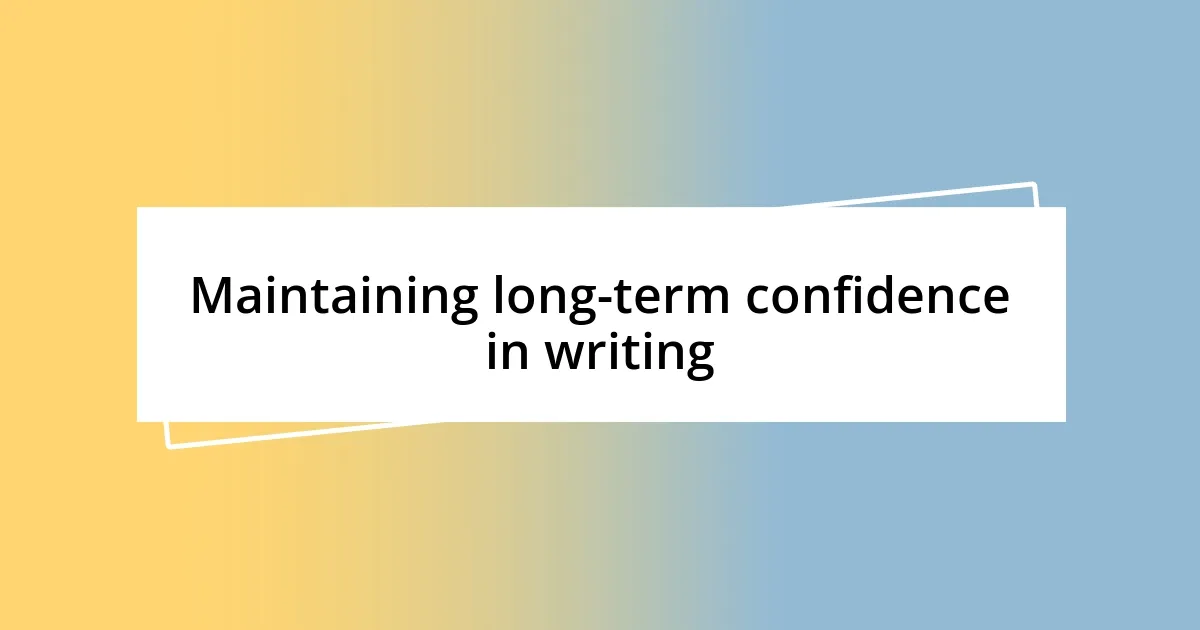
Maintaining long-term confidence in writing
Long-term confidence in writing isn’t just a destination; it’s a continuous journey. I often remind myself that growth is gradual. Recently, I went back to a piece I wrote a year ago and was surprised to see how much my style has evolved. It hit me: every draft, every idea is a stepping stone. Have you taken a moment to revisit your past work and see how far you’ve come? It’s often a powerful reminder that confidence builds upon itself, layer by layer.
To maintain that confidence, I find it’s important to cultivate a supportive writing community. A few months back, I connected with some fellow writers online, and their insights and encouragement have been invaluable. We’ve started a monthly challenge where we share our writings and celebrate each other’s improvements. I remember one writer expressing how my feedback on their piece boosted their confidence immensely. Witnessing others grow reminds me that we’re all in this together, fueling my own confidence in the process.
Lastly, I focus on honing my craft through continual learning. I regularly attend workshops or read books about writing, which not only enhances my skills but also gives me new perspectives. There’s always something more to learn, isn’t there? Just the other day, I read about the power of emotional storytelling and immediately tried it in my next draft. The thrill of experimenting with new techniques revitalizes my passion and helps stoke my long-term confidence in what I can create. Embracing growth, togetherness, and exploration has been a game changer for me—what strategies do you think could fuel your writing confidence?
